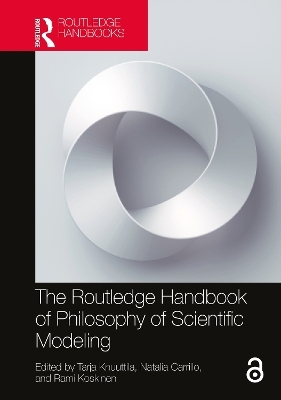
The Routledge Handbook of Philosophy of Scientific Modeling
Routledge (Verlag)
978-1-032-07151-0 (ISBN)
Models and modeling have played an increasingly important role in philosophy, going back to the nineteenth century. While philosophical interest in models has been remarkably lively over the last two decades, there are still many underexplored questions. The Routledge Handbook of Philosophy of Scientific Modeling is an outstanding reference source and guide to this fast-growing area and is the first volume of its kind. Comprised of 40 specially commissioned chapters by an international team of contributors, the Handbook is organized into five clear parts:
Historical and General Perspectives
Philosophical Accounts of Modeling
Methodological Aspects: Model Construction, Evaluation, and Calibration
Related Topics
Modeling in the Wild.
Within these parts, the Handbook covers a diverse range of topics, including historical perspectives on modeling, the relationship between models, theories, representation, idealization, and understanding, and related topics like big data, simulation, and statistical and computational modeling. Different kinds of models are discussed, for example, network models, financial models, and climate and synthetic models.
The Routledge Handbook of Philosophy of Scientific Modeling is essential reading for students and scholars of philosophy of science, formal epistemology, and philosophy of social sciences. It is also a valuable resource for those in related fields such as computer science and information technology.
Tarja Knuuttila is a Professor of Philosophy of Science at the University of Vienna, Austria. She has developed an artifactual account of models. Knuuttila focuses, in her research, on scientific modeling, interdisciplinarity, and the modal dimension of science with a special focus on synthetic biology, engineering sciences, and economics. Natalia Carrillo is an Associate Researcher at the Institute of Philosophical Research at the National Autonomous University of Mexico (UNAM). She is interested in philosophical problems at the intersection of philosophy of science and technology, especially artifactuality and abstraction in modeling practices, and the role of analogies and metaphors in science. Rami Koskinen is a Researcher at the University of Vienna, Austria, with an interest in the general philosophy of science, philosophy of biology, and epistemology. He has been investigating modal reasoning in the sciences, modeling in synthetic biology, and the question of multiple realizability.
Introduction Tarja Knuuttila, Natalia Carrillo, and Rami Koskinen Part 1: Historical and General Perspectives 1. The Emergence of the Modelling Attitude Mauricio Suárez 2. Theories and Models Roman Frigg 3. Practice-Oriented Approaches to Scientific Modeling Axel Gelfert Part 2: Philosophical Accounts of Modeling 4. Representation Julia Sánchez-Dorado 5. Idealization Collin Rice 6. De-Idealization Alejandro Cassini 7. Models, Fiction, and the Imagination Arnon Levy 8. The Artifactual Account of Modeling Tarja Knuuttila 9. Target Systems Francesca Pero 10. Minimal Models Chris Pincock 11. Computer Simulation Juan M. Durán 12. Scientific Laws and Theoretical Models Krzysztof Nowak-Posadzy and Jarosław Boruszewski 13. The Puzzle of Model-Based Explanation N. Emrah Aydinonat Part 3: Methodological Aspects: Model Construction, Evaluation and Calibration 14. Robustness Analysis Dunja Šešelja, Wybo Houkes, and Krist Vaesen 15. Model Evaluation Wendy S. Parker 16. Mathematization Marcel Boumans 17. The Debated Role of Models in Statistics Johannes Lenhard 18. Models, Data Models and Big Data Leticia Castillo Brache and Alisa Bokulich 19. Models and Measurement Eran Tal 20. Model Transfer Catherine Herfeld Part 4: Related Topics 21. Exemplification and Representation-as Catherine Z. Elgin 22. Scientific Understanding Insa Lawler 23. Modalities in Modeling Ylwa Sjölin Wirling and Till Grüne-Yanoff 24. Scientific Models and Thought Experiments Rawad el Skaf and Michael T. Stuart 25. Models and Maps Rasmus Grønfeldt Winther 26. Metaphors and Analogies Sergio Martínez 27. Narratives Mary S. Morgan 28. Models and Values Kristina Rolin 29. Interdisciplinarity through Modelling Mieke Boon 30. The Learning of Modeling K.K. Mashood and Sanjay Chandrasekharan Part 5: Modeling in the Wild 31. Statistical Mechanical Models of Finance Patricia Palacios and Jennifer S. Jhun 32. Climate Models Ilkka Pättiniemi and Rami Koskinen 33. Epistemic Implications of Machine Learning Models in Science Juan M. Durán Stefan Buijsman 34. In Vitro Analogies: Simulation Modeling in Biomedical Engineering Sciences Nancy J. Nersessian 35. Synthetic Models in Biology Andrea Loettgers and Tarja Knuuttila 36. Modeling the Deep Past Adrian Currie 37. Models and Measurement of Inequality Chiara Lisciandra and Alessandra Basso 38. Formal Language Theory and Its Interdisciplinary Applications Chia-Hua Lin 39. How Network Models Contribute to Science Charles Rathkopf 40. Models of the Nerve Impulse Natalia Carrillo. Index
| Erscheinungsdatum | 07.09.2024 |
|---|---|
| Reihe/Serie | Routledge Handbooks in Philosophy |
| Zusatzinfo | 16 Line drawings, black and white; 16 Illustrations, black and white |
| Verlagsort | London |
| Sprache | englisch |
| Maße | 174 x 246 mm |
| Gewicht | 1240 g |
| Themenwelt | Geisteswissenschaften ► Philosophie ► Logik |
| Mathematik / Informatik ► Mathematik | |
| Naturwissenschaften | |
| ISBN-10 | 1-032-07151-6 / 1032071516 |
| ISBN-13 | 978-1-032-07151-0 / 9781032071510 |
| Zustand | Neuware |
| Haben Sie eine Frage zum Produkt? |
aus dem Bereich


